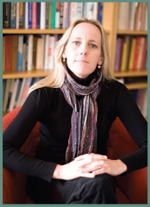Editor’s Note
 I’M SKEPTICAL about a great many things. Personally, I’m skeptical that a smartphone will drastically improve my life. I’m skeptical that my hybrid has or ever could get the kind of gas mileage the manufacturer advertised when I bought it eight years ago. And I’m also skeptical that people get as much sleep, have as much sex, or make as much money as they say they do. But these are all things that could be measured and verified if all parties were so inclined. They’re the testables, so to speak. And it’s the testables and what they yield that get the crowd on this issue’s cover excited. But what is it that gets skeptics so testy? It isn’t the extraordinary claims themselves—the auras and mysticisms and gods and alternative medicines and the like—but rather the protection or shielding of such things (of anything) from critical inquiry and investigation.
I’M SKEPTICAL about a great many things. Personally, I’m skeptical that a smartphone will drastically improve my life. I’m skeptical that my hybrid has or ever could get the kind of gas mileage the manufacturer advertised when I bought it eight years ago. And I’m also skeptical that people get as much sleep, have as much sex, or make as much money as they say they do. But these are all things that could be measured and verified if all parties were so inclined. They’re the testables, so to speak. And it’s the testables and what they yield that get the crowd on this issue’s cover excited. But what is it that gets skeptics so testy? It isn’t the extraordinary claims themselves—the auras and mysticisms and gods and alternative medicines and the like—but rather the protection or shielding of such things (of anything) from critical inquiry and investigation.
I’m reminded of a night my husband and I were driving in the hills above Laguna Beach (historically a hotbed for West Coast New Age thinking). We came to a traffic signal where a slick black Porsche idled in front of us, and through the rear window we could make out a pyramid-shaped form sitting atop the driver’s head. We couldn’t decide which was funnier—the idea that the guy was driving around wearing a pyramid on his head in order to channel paranormal energy, or that he was doing it in the dark.
Metaphorically speaking, the contemporary skeptical movement, as profiled by Brian Trent in the issue at hand, wants to flag you down, pull you out of your Porsche, and sit you under a streetlight to find out exactly what’s up with that pyramid.
The problem is that so many people find comfort in irrationality and it’s so often reinforced. The April 8 New York Times, for example, ran an op-ed by Matthew Hutson titled, “In Defense of Superstition.” In it, the former Psychology Today editor and author of the forthcoming book, The 7 Laws of Magical Thinking: How Irrational Beliefs Keep Us Happy, Healthy, and Sane, claims that “some level of belief in the supernatural—often a subtle and subconscious belief—appears to be unavoidable, even among skeptics.” (Now of that I’m quite skeptical.) “The good news,” he continues, “is that superstitious thought, or ‘magical thinking,’ even as it misrepresents reality, has its advantages.”
Hutson goes on to elucidate some of those advantages, one being the sense of meaning with which magical thinking imbues our lives (the unconvincing teleological angle). Another is confidence. Like Dumbo with his magic feather, believing that luck or other paranormal forces are assisting us in our endeavors helps us perform better and achieve more. Of course, these are only “positive” examples of delusion. Hutson doesn’t touch on the dangerous types (Christian Science comes to mind) or what happens when a good luck charm goes missing.
And lest nontheists think they’re immune, keep in mind the Baylor University study four years ago which found that less religious people are more likely to believe in other instances of the paranormal like ESP, ghosts, and UFOs. This doesn’t mean that the nonreligious are more superstitious than their religious counterparts, though. It just means that lots of people are susceptible to wishful thinking. And today’s skeptics adamantly want to change that. Why? Certainly there’s satisfaction to be had in debunking extraordinary claims and exposing people’s gullibility, but skepticism as a mindset goes beyond that; in a more positive vein, skeptics don’t want to make people feel stupid so much as they want people to be smart. As the wonderful stalwart of skepticism Michael Shermer put it in his 1997 book, Why People Believe Weird Things: “The goal is to know the universe, the world, and ourselves … [When skeptics] hear a fantastic claim we say, ‘that’s nice, prove it.’ ”
Jennifer Bardi is the editor of the Humanist.
